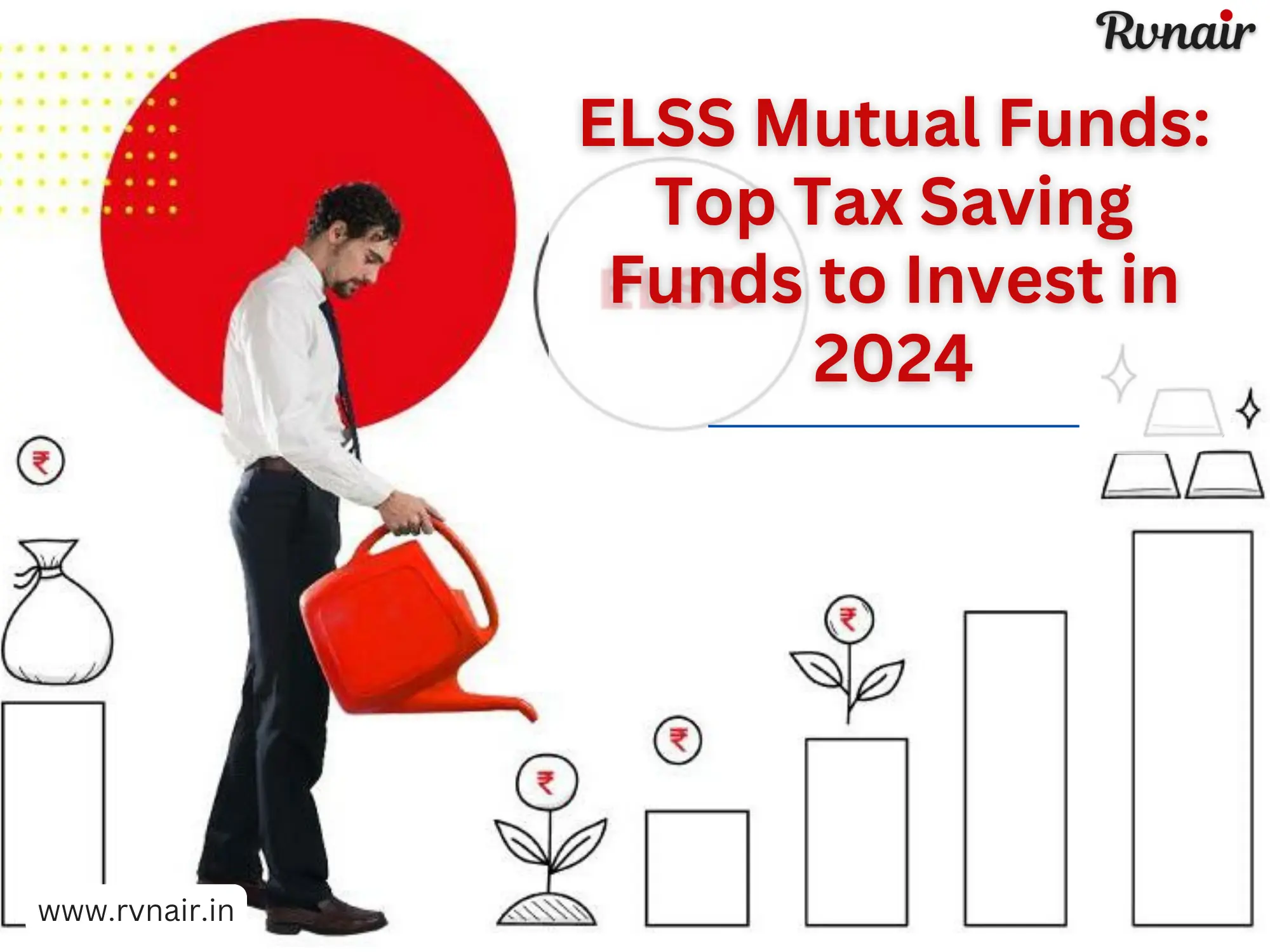ELSS (Equity Linked Savings Scheme) Mutual Funds, also known as tax-saving mutual funds, provide a double advantage of potential capital growth and tax benefits under Section 80C of the Income Tax Act. These funds mainly invest in equity and equity-related instruments, giving investors a chance to benefit from the stock market’s growth. With a short lock-in period of three years, ELSS is one of the quickest commitments among tax-saving options, ensuring you can access your money after this period.
What are ELSS funds?
ELSS Funds form a category of mutual funds that allocate at least 80% of their total funds to equity and equity-related instruments. With a mandatory 3-year lock-in period, these funds serve as a tax-saving avenue under Section 80C of the Income Tax Act. Investors can potentially claim tax deductions of up to Rs. 1.5 lakh by choosing these funds. ELSS funds operate, similar to equity funds, but maintain a three-year lock-in period to qualify for tax benefits. The trades within these funds are executed by a professional fund managers employed by the mutual fund provider or the AMC. Their objective is to maximise returns on investments while implementing a designated investment strategy to maintain reasonable control against risks.
The three-year lock-in period in ELSS funds not only promotes tax savings but also aligns with the fund managers’ strategy to ensure a more stable and controlled investment approach.
Benefits of investing in ELSS mutual funds
Discover the advantages of investing in ELSS mutual funds in 2024:
- Minimal lock-in period: ELSS mutual funds provides the shortest lock-in period as compared to other tax-saving investment alternatives. Unlike the 15-year minimum maturity period of options like PPF, these tax-saver fund schemes offer more liquidity.
- Potential for high returns: Differing from fixed-income options such as fixed deposits and PPF, ELSS mutual funds invest in diverse stocks/equity, causing their Net Asset Value (NAV) to fluctuate. Positive movements in the prices of these underlying securities can result in substantial returns for investors.
- Tax benefits: Investments up to Rs. 1.5 lakh qualify for tax deductions under the Income Tax Act.
Individuals can choose between two approaches to invest in the finest ELSS mutual funds – Systematic Investment Plan (SIP) and lumpsum. SIP enables individuals to invest in a scheme by making fixed instalments at regular intervals (monthly, quarterly, annually, etc.). Conversely, the lumpsum method allows investors to allocate available funds to an ELSS mutual fund scheme in a single transaction.
How ELSS Mutual Funds work?
Equity Linked Saving Schemes (ELSS) are a type of mutual fund that combines the dual benefits of tax-saving and wealth creation. Operating under a three-year lock-in period, ELSS funds primarily invest in equity and equity-related instruments, providing investors an opportunity to participate in the growth potential of the stock market. The mandatory lock-in period ensures a disciplined approach, aligning with long-term wealth creation objectives.
ELSS funds offer tax benefits under Section 80C of the Income Tax Act, allowing investors to claim deductions up to Rs. 1.5 lakh from their taxable income. This makes ELSS a popular choice for individuals seeking tax-efficient investment avenues. The funds are managed by experienced fund managers who strategically allocate assets across various sectors and market capitalisations to optimise returns.
Capital gains from ELSS are subject to taxation. Short-term capital gains (STCG), if the units are sold within a year, incur a 15% tax, while long-term capital gains (LTCG) are taxed at 10% on gains exceeding Rs. 1 lakh provided the investment is held for more than one year.
ELSS mutual funds provide investors with an avenue to create wealth over the long term, coupled with the advantage of tax savings, making them a versatile and popular investment choice in the Indian market.
Who should invest in ELSS Mutual Funds?
Features of Tax Saving Mutual Funds
ELSS Mutual Funds offer a unique combination of tax benefits and wealth creation potential. This section explores the key features of ELSS, including tax deductions, lock-in period, and investment style, to help you decide if they fit your financial goals.
- These funds ensure diversification by investing in equities spanning various sectors, themes, and market capitalisations.
At least 80% of the fund’s capital is allocated to equity and equity-related instruments, while the rest is invested in hybrid and debt funds.
ELSS schemes lack a specified maximum investment tenure.
Earnings from these schemes qualify as long-term capital gains (LTCG), subject to corresponding tax implications.
Section 80C of the Income Tax Act outlines the tax benefits on the invested capital.
How to choose a Tax Saving Mutual Fund?
Choosing the right tax-saver fund depends on factors like risk tolerance, financial goals, and investment horizon. Understanding your risk profile is crucial for selecting the most suitable scheme.
- Investment strategy/objective: Every fund has a declared investment strategy and objective, that explains their approach to investment. Investors should understand the approach taken by these funds so they can decide if it matches with their personal preference.
- Match goals: Your investment goals can vary from tax savings to long term capital appreciation. Knowing this can help you find funds that can support these goals.
- Risk vs. reward: Tax-saver funds take higher risks for proportionately higher rewards. By analyzing the risks taken by the mutual fund, investors can discover if they match with their own personal risk profile and preferences.
- Liquidity preference: Investors should know when they will need their investment corpus. Tax-saver funds are designed for medium to long term returns, with a minimum period of one year for any results to materialize. If your liquidity requirements are shorter than that, consider investing in debt funds instead.
What are the risks associated with ELSS Funds?
Every investment possesses some degree of inherent risk and ELSS, despite being one of the most popular tax-saving products in the market today, is no different. The risks associated with investing in ELSS funds are common across all equity based mutual funds, such as no guarantee or assured returns and loss of principal amount due to market volatility, interest rate fluctuations, changes in government policy, and political developments. Apart from these common factors, there are some risks that specifically relate to equity-related investments. These risks are a direct result of the volatility inherent in the equity market, and include:
1. Risk of total loss – Tax-saver and related securities can potentially result in total loss of principal investments.
2. Price risk – Market conditions can result in daily price fluctuations.
3. Liquidity risk – Settlement periods can be unpredictably extended and the ability to sell can be restricted by overall trading volume of specific stocks in the portfolio. This limits the ability of the fund to sell held securities which can result in potential losses and fall in value of the scheme. And in case of tax-saver funds, there is also a three-year lock-in period which further poses liquidity issues.
4. Event risk – Any unexpected or detrimental event impacting a company or industry in which the mutual fund is invested can result in a price risk.
Taxation on ELSS Mutual Funds
Investing in ELSS funds involves a 3-year lock-in, ensuring long-term capital gains. Gains up to Rs. 1 lakh annually are tax-free, with a 10% tax on amounts beyond. Under section 80C investors get a tax deduction of up to Rs. 1.5 lakh on ELSS investments and other specified instruments. Upon redeeming ELSS units after the mandatory 3-year lock-in, you receive long-term capital gains (LTCG), with gains up to Rs. 1 lakh per year being tax-free. Any LTCG beyond this limit incurs a 10% tax on gains exceeding Rs. 1 lakh without indexation.
Factors to be considered while investing in ELSS Funds
When selecting the best ELSS funds to invest in 2024, it is crucial to assess the following factors:
- Lock-in period: ELSS funds entail a minimum lock-in period of three years, preventing investors from redeeming holdings before this duration. This consideration is vital for investors who should be mindful of this commitment.
- Return potential: ELSS funds do not assure guaranteed returns, as they depend on the performance of underlying securities. Despite this, a more extended investment horizon can potentially result in higher returns compared to other tax-saving options.
- Investment horizon: Opting for ELSS funds requires a longer investment horizon, often exceeding five years. This extended period is necessary to mitigate the impact of market volatility, given the equity exposure of ELSS funds.
Frequently asked questions
Which ELSS mutual fund is best?
Determining the best ELSS fund depends on individual financial goals, risk tolerance, and investment horizon.
What is ELSS in mutual funds?
Equity Linked Saving Scheme (ELSS) is a type of mutual fund that primarily invests in equity and equity-related instruments. ELSS funds offer tax benefits under Section 80C of the Income Tax Act, making them a popular choice for tax-saving purposes.
Is ELSS tax free after 3 years?
While ELSS gains are tax-free during the 3-year lock-in, after this period, long-term capital gains (LTCG) up to Rs. 1 lakh per year remain tax-free. Gains beyond this limit are subject to a 10% LTCG tax without indexation.
Is PPF better than ELSS?
PPF and ELSS serve different purposes. PPF is a fixed-income, long-term investment with a 15-year lock-in, offering guaranteed returns. ELSS, with a 3-year lock-in, focuses on equity and provides the potential for higher returns.
Which mutual fund is best for tax saving?
ELSS funds are popular for tax-saving, offering the potential for higher returns.
Is ELSS good or bad?
ELSS can be beneficial for tax-saving and potential wealth creation due to equity exposure. However, risks associated with market fluctuations should be considered. Assessing individual financial goals and risk tolerance is crucial.
Does ELSS give better returns?
ELSS, investing in equities, has the potential for better returns compared to fixed-income options. However, returns are subject to market fluctuations, and past performance does not guarantee future results.
Which month is best to invest in ELSS?
ELSS investments can be made throughout the year, but investing early in the financial year (April to March) allows for longer market exposure. Timing is less critical for long-term investors due to the 3-year lock-in.
Can I pay ELSS monthly?
Yes, ELSS offers a Systematic Investment Plan (SIP) option, allowing investors to contribute fixed amounts monthly. SIPs offer rupee-cost averaging and disciplined investing, making it convenient for investors.
Is ELSS taxable on maturity?
ELSS gains are tax-free up to Rs. 1 lakh annually after the 3-year lock-in. Gains beyond this limit are subject to a 10% long-term capital gains tax without indexation.
What is the average return in 10 years for ELSS?
ELSS returns vary, and historical performance does not guarantee future results.
What is the minimum holding period for ELSS?
ELSS has a mandatory lock-in period of 3 years, during which units cannot be redeemed. After the lock-in, investors can choose to stay invested or redeem based on their financial goals.

